The 6 Best Natural Remedies for Keratosis Pilaris

25 Top Home Remedies That Really Work
Explore powerful home remedies for common health issues
Discover how to use everyday household ingredients to address minor ailments
Get practical tips for the safe and effective use of home remedies

25 Top Home Remedies That Really Work
Explore powerful home remedies for common health issues
Discover how to use everyday household ingredients to address minor ailments
Get practical tips for the safe and effective use of home remedies

25 Top Home Remedies That Really Work
Explore powerful home remedies for common health issues
Discover how to use everyday household ingredients to address minor ailments
Get practical tips for the safe and effective use of home remedies

25 Top Home Remedies That Really Work
Explore powerful home remedies for common health issues
Discover how to use everyday household ingredients to address minor ailments
Get practical tips for the safe and effective use of home remedies

25 Top Home Remedies That Really Work
Explore powerful home remedies for common health issues
Discover how to use everyday household ingredients to address minor ailments
Get practical tips for the safe and effective use of home remedies

25 Top Home Remedies That Really Work
Explore powerful home remedies for common health issues
Discover how to use everyday household ingredients to address minor ailments
Get practical tips for the safe and effective use of home remedies

25 Top Home Remedies That Really Work
Explore powerful home remedies for common health issues
Discover how to use everyday household ingredients to address minor ailments
Get practical tips for the safe and effective use of home remedies

25 Top Home Remedies That Really Work
Explore powerful home remedies for common health issues
Discover how to use everyday household ingredients to address minor ailments
Get practical tips for the safe and effective use of home remedies

25 Top Home Remedies That Really Work
Explore powerful home remedies for common health issues
Discover how to use everyday household ingredients to address minor ailments
Get practical tips for the safe and effective use of home remedies

25 Top Home Remedies That Really Work
Explore powerful home remedies for common health issues
Discover how to use everyday household ingredients to address minor ailments
Get practical tips for the safe and effective use of home remedies

25 Top Home Remedies That Really Work
Explore powerful home remedies for common health issues
Discover how to use everyday household ingredients to address minor ailments
Get practical tips for the safe and effective use of home remedies

25 Top Home Remedies That Really Work
Explore powerful home remedies for common health issues
Discover how to use everyday household ingredients to address minor ailments
Get practical tips for the safe and effective use of home remedies

25 Top Home Remedies That Really Work
Explore powerful home remedies for common health issues
Discover how to use everyday household ingredients to address minor ailments
Get practical tips for the safe and effective use of home remedies

25 Top Home Remedies That Really Work
Explore powerful home remedies for common health issues
Discover how to use everyday household ingredients to address minor ailments
Get practical tips for the safe and effective use of home remedies

25 Top Home Remedies That Really Work
Explore powerful home remedies for common health issues
Discover how to use everyday household ingredients to address minor ailments
Get practical tips for the safe and effective use of home remedies

25 Top Home Remedies That Really Work
Explore powerful home remedies for common health issues
Discover how to use everyday household ingredients to address minor ailments
Get practical tips for the safe and effective use of home remedies

25 Top Home Remedies That Really Work
Explore powerful home remedies for common health issues
Discover how to use everyday household ingredients to address minor ailments
Get practical tips for the safe and effective use of home remedies

25 Top Home Remedies That Really Work
Explore powerful home remedies for common health issues
Discover how to use everyday household ingredients to address minor ailments
Get practical tips for the safe and effective use of home remedies

25 Top Home Remedies That Really Work
Explore powerful home remedies for common health issues
Discover how to use everyday household ingredients to address minor ailments
Get practical tips for the safe and effective use of home remedies

25 Top Home Remedies That Really Work
Explore powerful home remedies for common health issues
Discover how to use everyday household ingredients to address minor ailments
Get practical tips for the safe and effective use of home remedies

25 Top Home Remedies That Really Work
Explore powerful home remedies for common health issues
Discover how to use everyday household ingredients to address minor ailments
Get practical tips for the safe and effective use of home remedies

25 Top Home Remedies That Really Work
Explore powerful home remedies for common health issues
Discover how to use everyday household ingredients to address minor ailments
Get practical tips for the safe and effective use of home remedies

25 Top Home Remedies That Really Work
Explore powerful home remedies for common health issues
Discover how to use everyday household ingredients to address minor ailments
Get practical tips for the safe and effective use of home remedies

25 Top Home Remedies That Really Work
Explore powerful home remedies for common health issues
Discover how to use everyday household ingredients to address minor ailments
Get practical tips for the safe and effective use of home remedies
Keratosis pilaris occurs when dead skin cells clog hair follicles, leading to irritated skin, rough feeling bumps, and redness.
Learn more about the root causes of this chronic skin condition and discover six natural remedies for keratosis pilaris.
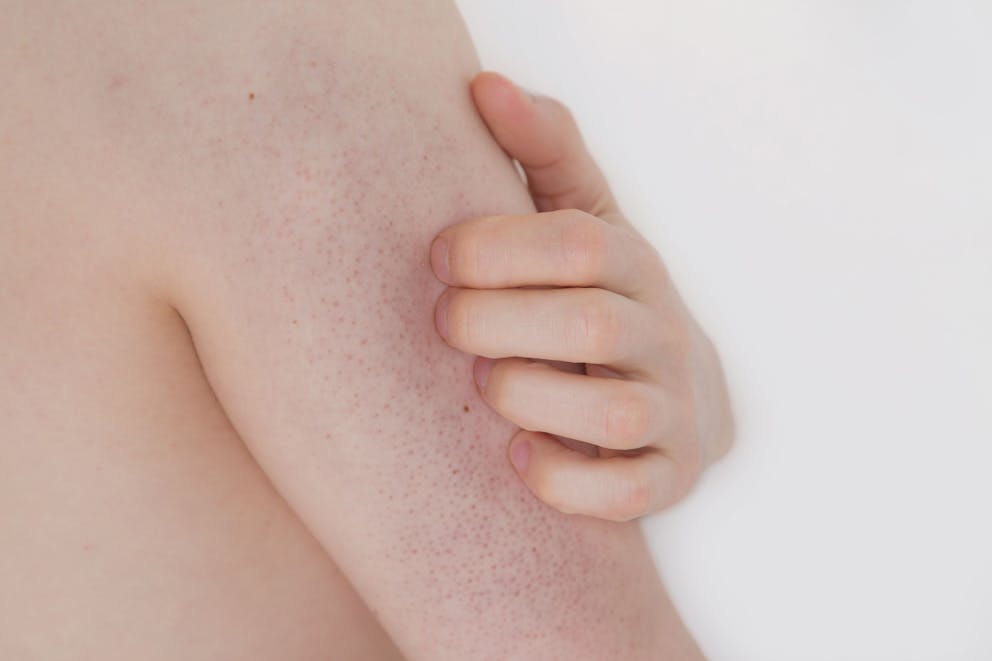
What is keratosis pilaris?
Keratosis pilaris is a chronic skin condition characterized by rough patches of raised bumps resembling plucked chicken skin.
It’s a common skin issue, and it’s believed that between 50 and 80 percent of all adolescents and around 40 percent of adults experience this condition at some point in their lives.
Some of the most common keratosis pilaris symptoms include:
Itchiness
Dry skin
Clogged pores
Skin discoloration
Skin plugs that feel like sandpaper bumps
Although keratosis pilaris is a harmless condition, its appearance can have detrimental psychological effects and lead to low self-esteem.
Keratosis pilaris can appear anywhere there are hair follicles, most commonly affecting the upper arms, thighs, buttocks, and cheeks. Though it’s usually found on the upper arms and legs, keratosis pilaris can also spread to the forearms and down the legs.
Watch the video below to learn about the best remedy for keratosis pilaris.
Causes and risk factors
Researchers consider the cause of keratosis pilaris to be multifaceted. However, the consensus is that keratosis pilaris is caused by a buildup of keratin on the skin.
Normal skin sloughs off dead cells, reducing excess keratin on the skin’s surface. In those affected with keratosis pilaris, excess keratin can clog hair follicles, contributing to bumpy patches and pustules.
Research published in the International Journal of Trichology suggests that keratosis pilaris is caused by defective hair shaft formation. Thick and circular hair shafts can rupture follicle cells and cause abnormal follicular keratinization and inflammation.
While more research is needed, other potential causes of keratosis pilaris have been suggested.
Here are six risk factors associated with keratosis pilaris.
1. Vitamin A deficiency
Vitamin A deficiency is associated with various skin conditions, including acne, eczema, and keratosis pilaris.
According to a study published in the American Journal of Pathology, “An acquired increase in the incidence of keratosis pilaris-like lesions is observed in obesity, diabetes, pregnancy, menopause, and malnutrition, particularly in association with vitamin A deficiency.”
In skin conditions such as acne, the administration of vitamin A has shown improvement. This could suggest that vitamin A may have a similar effect on keratosis pilaris.
2. Hormonal imbalances
Excess androgens are another potential cause of keratosis pilaris.
Evidence published in the British Journal of Dermatology supports the correlation between hormonal imbalances and keratosis pilaris severity, particularly in women with polycystic ovary syndrome (PCOS), which is characterized by excess androgens.
3. Poor metabolic health
Obesity and insulin resistance may also play a role in the development of keratosis pilaris.
Data published in Dermatology and Therapy showed that keratosis pilaris is common in obese individuals and concluded that skin conditions were a reliable indicator for insulin resistance.

4. Weather changes
Keratosis pilaris typically worsens during winter months when the air is dry and improves in the summer.
Research published in the British Journal of Dermatology showed that 47 percent of participants with keratosis pilaris experienced heightened symptoms in the winter, and 49 percent of cases improved during summer when the air contained higher humidity.
5. Genetic predisposition
Keratosis pilaris may have a genetic link.
A study published in Molecular Medicine Reports found that keratosis pilaris is an autosomal dominant-inherited disease passed down from parents to their children. Children with parents that have certain genetic polymorphisms have a 50 percent chance of inheriting the condition.
6. Age
Keratosis pilaris primarily develops during childhood, peaks during puberty, and may persist into the second decade of life. However, it typically resolves independently once a person reaches their 30s.
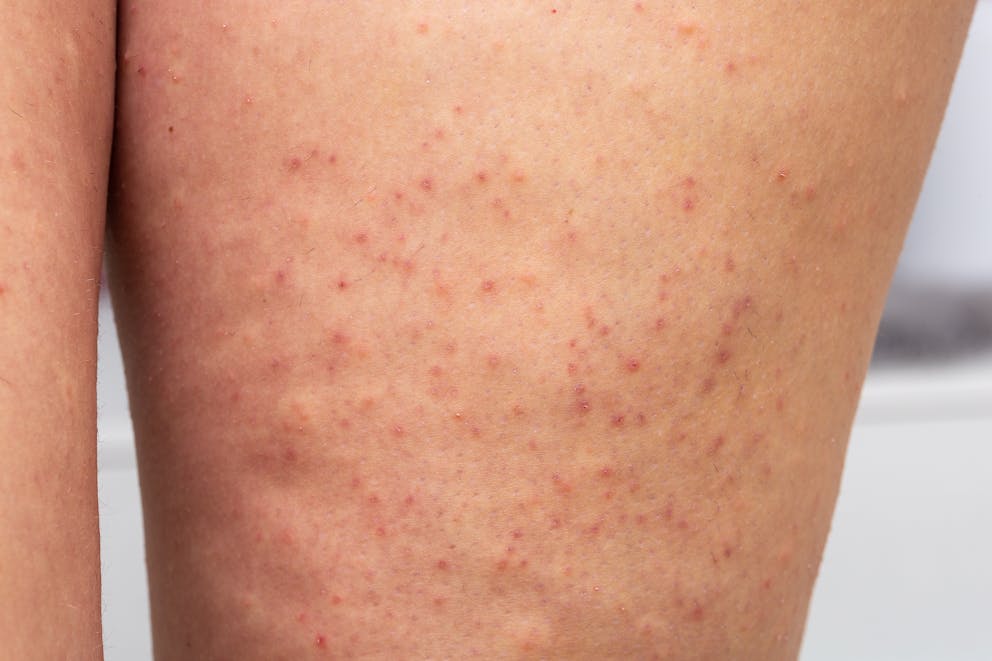
6 best natural remedies for keratosis pilaris
Though keratosis pilaris is a superficial skin condition, it leaves skin feeling dry and itchy and can significantly affect an individual's self-esteem. Luckily, various remedies can help smooth the skin and relieve discomfort.
Here are six natural remedies to improve keratosis pilaris.
1. Cod liver oil
Cod liver oil is healthy and rich in vitamins A and D.
These fat-soluble vitamins are essential for skin health and can help manage keratosis pilaris from the inside. One teaspoon of cod liver oil contains approximately 150 percent of vitamin A's recommended dietary allowance (RDA).
Dr. Berg explains, “Cod liver oil is anti-inflammatory, helps balance blood sugar levels, and is one of the best sources of vitamin A, crucial for normal keratin production and skin health.”
2. Dry brushing
Dry brushing is a manual alternative to chemical exfoliants, such as salicylic acid and glycolic acid. Natural bristle brushes are used for gentle exfoliation to unplug the hair follicle and smooth skin.
Before you shower, brush your skin with a soft-bristled brush in light sweeping motions. Then, shower and hydrate the skin with a natural oil.
3. Exfoliating with sea salt
Exfoliating with sea salt can help slough off dead skin and retain moisture in the skin barrier.
One study published in Skin Research and Technology showed that sea salt improved skin dryness in as little as two weeks of regular application.
You can make a homemade body scrub with sea salt, coconut oil, honey, and essential oils for hydration and gentle exfoliation.
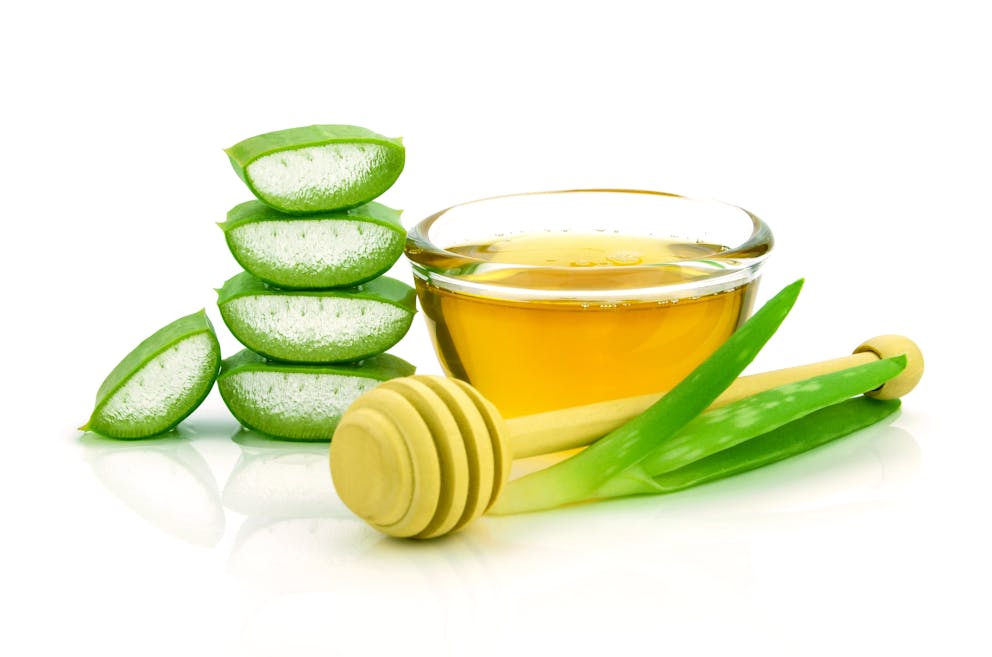
4. Use moisturizing cleansers
Harsh cleansers with perfumes, dyes, and alcohol may leave skin dry and worsen keratosis pilaris.
Opt for soaps or cleansers with natural moisturizers like olive oil, aloe vera, or jojoba oil. Natural soaps gently cleanse, remove dead skin cells, and lock in moisture, which can help reduce keratosis pilaris flare-ups.
5. Natural moisturizers
Moisturize damp skin with natural oils after exfoliating and showering to improve skin hydration. Avocado oil is a natural moisturizer rich in vitamin A that supports optimal skin barrier function.
Coconut oil is another natural moisturizer that contains anti-inflammatory properties.
According to a study published in Evidence-Based Complementary and Alternative Medicine, coconut oil was an effective emollient and has been found to reduce inflammation in animal models.
6. Consume plenty of anti-inflammatory foods
Create a keratosis pilaris diet high in anti-inflammatory foods to help reduce skin inflammation associated with redness and bumpy patches.
Vegetables, berries, and organic meats are rich sources of antioxidants, vitamins, and minerals that support healthy skin function and appearance.
Here’s a list of some of the best anti-inflammatory foods:
Green leafy vegetables
Avocados
Nuts and seeds
Extra virgin olive oil
Ginger
Garlic
Green tea
In addition, foods rich in omega-3 fatty acids, such as cod liver oil, tuna, salmon, and sardines, can also mitigate inflammation and support healthy skin.
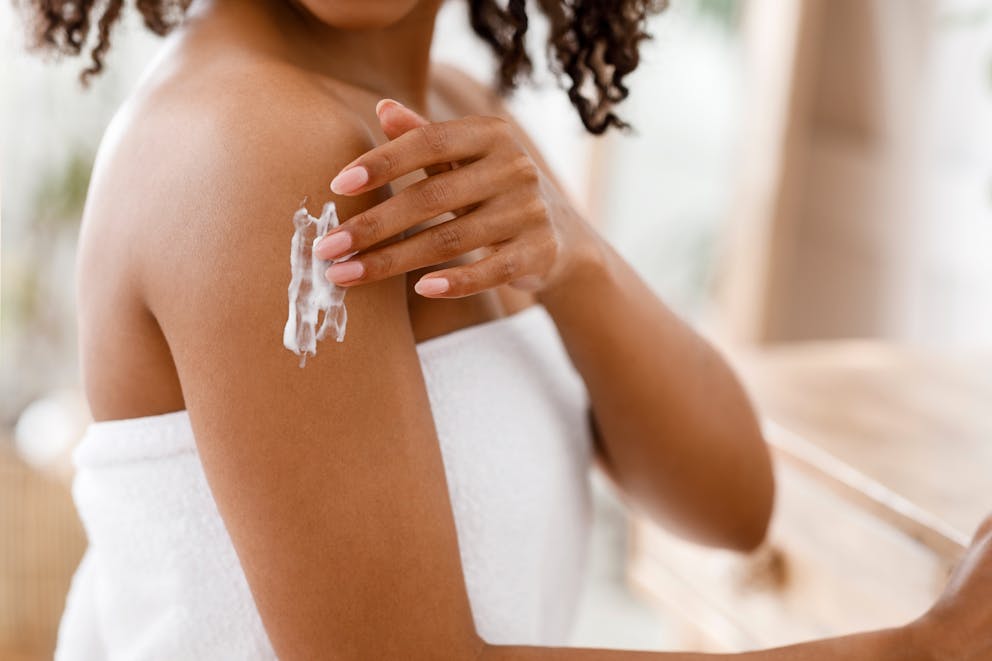
Keratosis pilaris prevention tips
Preventing keratosis pilaris may be impossible without identifying and addressing the underlying cause. However, flare-ups can be minimized with natural treatments and preventative care.
Here are five keratosis pilaris prevention tips.
1. Avoid shaving or waxing
Shaving and waxing areas affected by keratosis pilaris can worsen skin bumps and irritation.
Women with keratosis pilaris on their legs and men affected by bumpy skin patches on their faces may find it difficult to avoid shaving. If you must shave, a single-blade razor offers a closer shave and may help reduce skin irritation.
2. Wear loose clothing
Clothes that are too tight or made of a rough material can cause friction and further irritate the skin. It’s recommended to wear loose, breathable clothing made from softer fabrics, like cotton or linen.
3. Avoid scrubbing
A physical exfoliator can gently exfoliate dead skin and improve the look and feel of keratosis pilaris. However, scrubbing with harsh abrasive cleansers or overusing chemical exfoliators can leave sensitive skin raw.
Gently exfoliate the affected area weekly with dry brushing to remove dead skin without irritation.
4. Take warm showers
Long, hot showers can strip skin of natural oils and make keratosis pilaris worse. Most dermatologists recommend showering for no more than ten minutes using lukewarm water.
5. Use a humidifier
Keratosis pilaris worsens in the winter and dry climates. Humidifiers add moisture to the air, which helps hydrate the skin and minimize flare-ups.
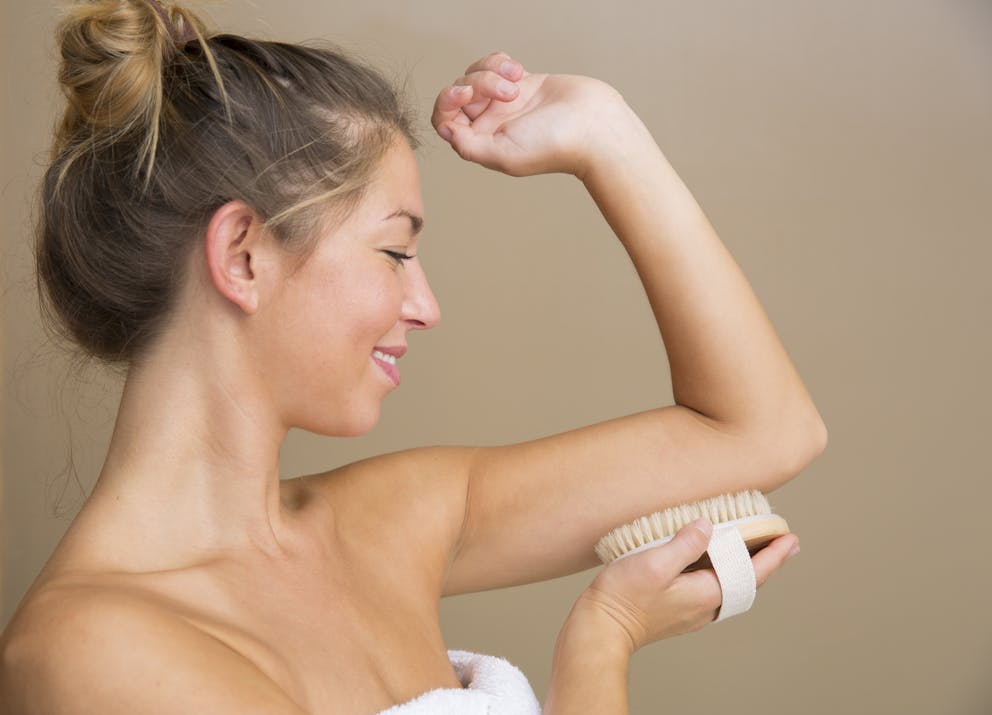
Key takeaways
Keratosis pilaris is a skin condition that causes clusters of bumps on the arms, legs, buttocks, or face.
While there is no cure for this skin condition, natural remedies for keratosis pilaris include taking cod liver oil, using moisturizers, and regularly dry brushing the skin.
FAQ
1. How do I cure my keratosis pilaris naturally?
There’s no cure for keratosis pilaris, but various natural remedies can improve this skin condition. Consuming plenty of nutritious whole foods and taking cod liver oil can support adequate levels of vitamin A and omega-3 fats, which are crucial for skin health.
Exfoliating once a week can remove dead skin cells and encourage cell turnover. Moisturize daily with avocado, jojoba, or coconut oil to soften skin and improve water retention.
2. Is keratosis pilaris caused by a vitamin deficiency?
Yes, there may be a link between keratosis pilaris and vitamin A deficiency.
Cod liver oil is a rich source of vitamin A and may help manage or prevent skin problems, including keratosis pilaris.
3. What is the root cause of keratosis pilaris?
Keratosis pilaris is caused by keratin buildup. Keratin is a hard protein that protects the skin but can block the opening of hair follicles, leading to dry skin and bumps on the upper arms, legs, or buttocks.
There also is evidence that genetic predisposition, hormonal imbalances, and vitamin A deficiency can increase the risk of keratosis pilaris.
4. How do you prevent keratosis pilaris?
It may not be possible to prevent or treat keratosis pilaris without identifying and addressing the root cause. However, you can minimize flare-ups by avoiding shaving, waxing, and taking hot baths or showers, as this can irritate the skin and exasperate dryness.
Wearing loose clothing, avoiding scrubbing, and using a humidifier may also help prevent flare-ups.
Sources
Previous blog
Diabetes Nutrition Guide – Everything You Need to KnowTags

Popular
08/21/2024
55K views
02/23/2025
46.3K views
11/18/2024
277.5K views
03/18/2024
11/21/2022




